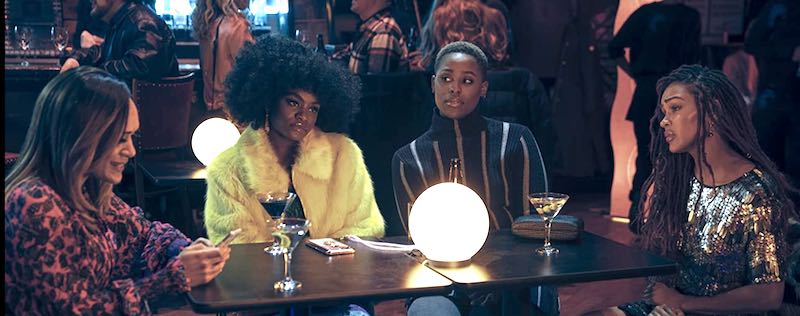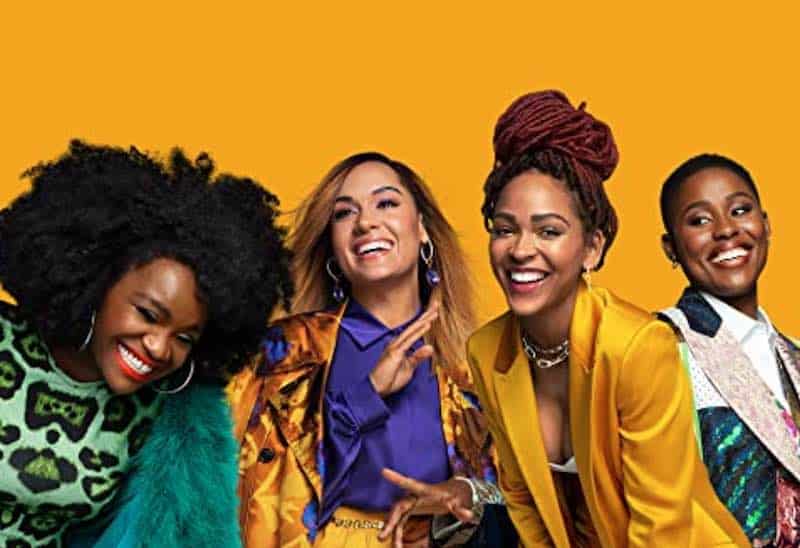Harlem is about four women and the disasters and successes of their sex lives. Its 10 half-hour episodes get off to a rocky start. The storyline gains strength as it goes along. Season 1 ends on a cliffhanger. Now that I’m invested in these characters, I certainly hope there’s a season 2. This is a Prime Video series.
Harlem is one of those comedy shows that focuses solely on the women’s sex lives. I know that puberty starts humans on a quest to pair up, find partners, and settle into love. It’s just biology. But when a series looks at only that part of women’s lives, it grows tedious. The vulnerabilities and insecurities of dating feel overly melodramatic sometimes. I have the same issue with other series in this genre – it isn’t specific to this production.
The best parts of this series were when the women were being who they were outside of sex – professors, designers, techies, performers. Their conversations about the impediments Black women face in society were the strongest part of the writing. There wasn’t enough of that, in my opinion. Their friendship and loyalty to each other was inspiring. They knew each others faults and weaknesses, and weren’t above pointing them out in an argument, but they loved each other.

The four (left to right) were Quinn (Grace Byers), Angie (Shoniqua Shandai), Tye (Jerrie Johnson), and Camille (Meagan Good). They told each other everything (well, almost everything) about every relationship, every hookup, every good night, and every bad night.
Meagan Good stood out for me as the best performance. Camille was trying to get tenure as a professor. She was in love with Ian (Tyler Lepley) but also involved with Jameson (Sullivan Jones).
Tye was a lesbian and the creator of a successful dating app for queer Black women. She was interviewed for Forbes Magazine, she was so successful. Tye really liked Anna (Kate Rockwell), but Anna was white – a problem for Tye’s image. Tye had some other problems we didn’t learn about until late in the season.
Quinn had been in finance and quit to design dresses. Her business was struggling and she frequently borrowed money from her mother (Jasmine Guy). Quinn had a long string of disastrous dates until she met Shawn (Robert Ri’chard). Even after meeting Shawn, Quinn was exploring her sexuality a bit at the end of the season.
Angie was a singer. She dreamed of being a star but was unemployed and lived rent free on Quinn’s couch. She got a part in a Broadway musical. Her attitude got her in trouble frequently as she wasn’t one to let microaggressions and injustices go unremarked.
A few other significant parts in the cast were played by Juani Feliz as a sort of AOC knockoff politician, Whoopi Goldberg as Camille’s new boss, and Andrea Martin as Camille’s old boss.
The series was a love letter to Harlem, the Harlem that used to be before gentrification set in. Camille was very tuned in to the changes and losses in Harlem and remarked on it in social media frequently.
The series was funny and full of unexpected turns that kept things fresh.
The series was created by Tracy Oliver. Women directors included Linda Mendoza, Stacey Muhammad, and Neema Barnette. The series was 99.9% female centric and immersed in the culture of thirtyish Black women living in Harlem.

Leave a Reply